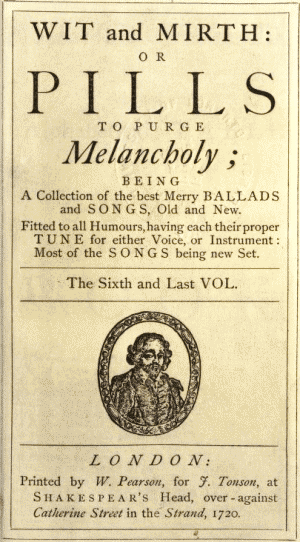Transcriber's NotePublication Date: 1719/1720 Author Lifespan: 1653-1723 [from English Song-Books by Day and Murrie: The origins of Wit and Mirth: or Pills to Purge Melancholy, the most famous song book of its day, may be traced back to a single volume of 'witty ballads,jovial songs, and merry catches' by an earlier generation of lyricists, published without music in 1661 under the title An Antidote against Melancholy: madeup in Pills. For the third edition, still without music but livened up by more recent songs, the title was changed to Wit and Mirth: An Antidote againstMelancholy (1682), and in 1699, still in one volume, it was published by Henry Playford with music. Over the course of the next two decades it was expandedand republished again and again, eventually to become this six-volume 'standard edition' of contemporary popular comic and bawdy ballads, with an increasingemphasis on the work of the stammering dramatist and lyricist Thomas D'Urfey, whose songs were sung by all the town. Among the composers were Dr. John Blowand Henry Purcell.] [from Wikipedia: Thomas D'Urfey (1653-1723) was an English dramatist and songwriter. He wrote the plays The Fond Husband in 1676,Madame Fickle in 1677 and The Virtuous Wife in 1680. He also wrote the song collection Wit and Mirth, or Pills to Purge Melancholy between 1719 and 1720.] Not all songs have music scores. Reference is made to tunes not in thisbook, but probably well known in London in 1719-20. [Readers using IE8 browser may need to use 'Compatibility View'] The rest of the Transcriber's Note is at the end of the book. |

WIT and MIRTH:
OR
PILLS TO PURGE MELANCHOLY
EDITED BY
THOMAS D'URFEY
IN SIX VOLUMES
VOLUME VI
FOLKLORE LIBRARY PUBLISHERS, INC.
NEW YORK
1959

AN
Alphabetical TABLE
OF THE
SONGS
Contain'd in this
BOOK.
| A | Music: Page. | Lyrics: Page. |
AS Amoret and Thyrsis lay, | 28 | 30 |
| As unconcern'd and free as Air, | 32 | 33 |
| As I am a Sailor, | 40 | 41 |
| And now, now the Duke's March, | 47 | 47 | ...